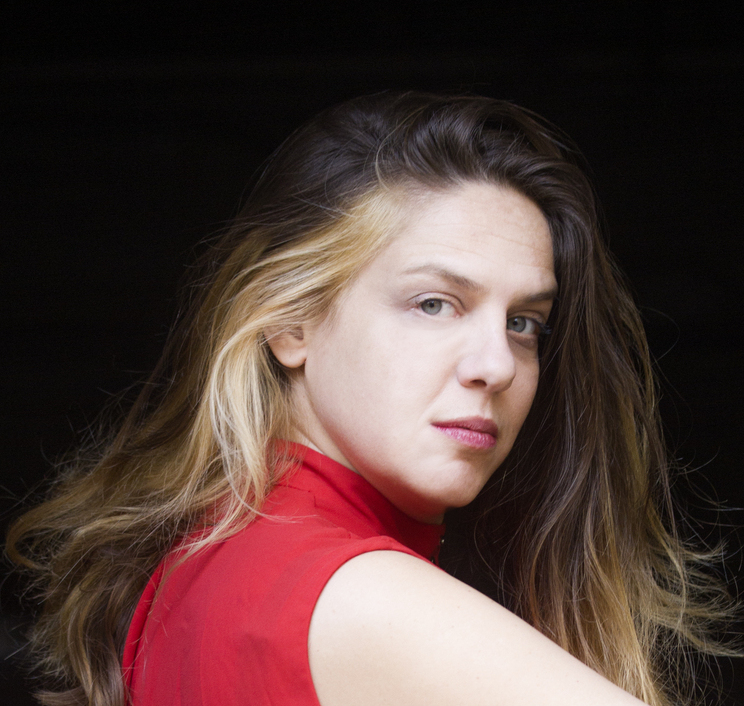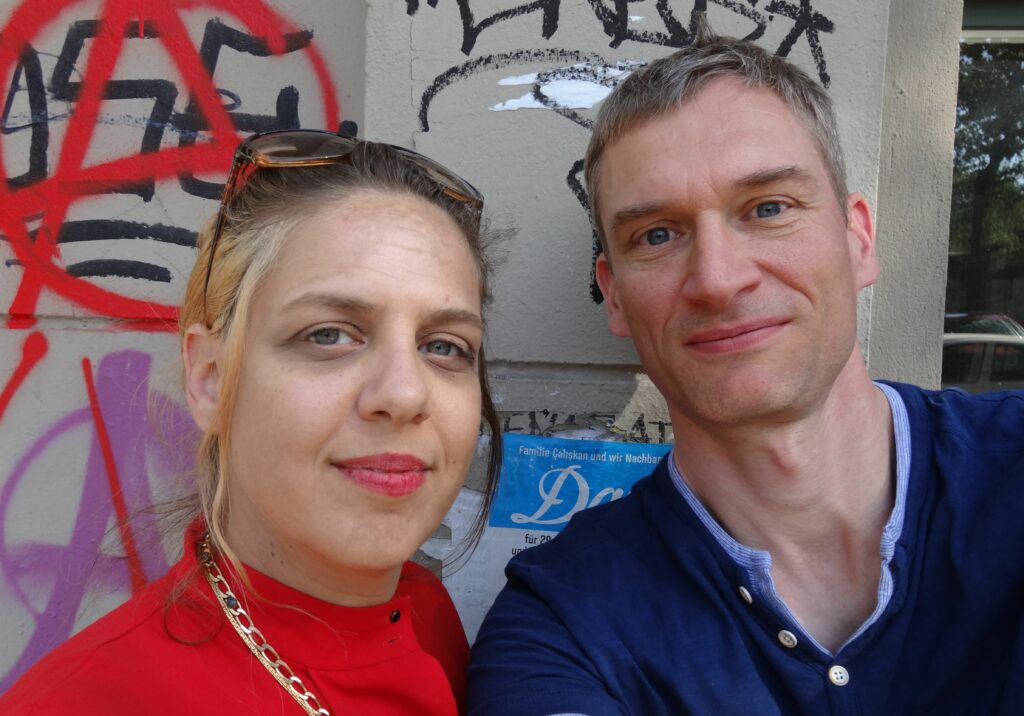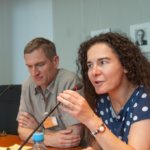Sivan Ben Yishai – Original and Translation
by Henning Bochert

Henning Bochert: Sivan, we worked closely together for the translation of your most recent play into German. The title remained in English for now: YOUR VERY OWN DOUBLE CRISIS CLUB. You wrote the play during the IN ZUKUNFT III workshop of the Neues Institut für Dramatisches Schreiben (New Institute for Dramatic Writing, NIDS) at the Westfälischen Landestheater in Castrop-Rauxel in 2016.
In the play, a voice talks about the forceful destruction of her city, about force, oppression, escape, and exile. What is your relationship to Israel?
Sivan Ben Yishai: Israel is close to exploding. The atmosphere, the intensity of the people is hard for me to bear. When I first came to Berlin, it was something like a utopia. Today I wonder whether the protective skin I grew here will disappear any time soon. My last play (I KNOW I’M UGLY BUT I GLITTER IN THE DARK) is about an Israeli who came to Berlin and went into a sort of inner emigration. He lives in an organic bed-chair that is already part of his body, living his life through the Internet. Are we looking for bubbles when we leave our homeland only to be constantly disappointed? The language is an important factor. Can you still love the place in the same way once you really truly understand the foreign language?
A few days ago, my mother and my sister left to Israel after their visit here, and I was crying for two days straight. After my first year here, my return to Israel and then coming back to Berlin was a very unsafe experience.
Frightening. I had no roots whatsoever. Now I feel safer. I have a network of people and projects sustaining me.
My language changed when I came to Germany. Is it my maturing as an artist, or is it a gigantic change that happened when I left my language? Before I came here, all my plays were in Hebrew, and they were written for the stage. You could only understand the piece when you would see the performance.
Henning: Because you directed them yourself. You put together the production, and part of it was the text. Why do you write in English?
Sivan: When I came to Germany, the language took over. How did that happen? Why did the words take over all of a sudden? In addition, they took over in English. That was a practical question. I worked at the Westfälisches Landestheater, German was impossible, so I wrote in English.
the language took over
Henning: Technically you could have found a Hebrew translator.
Sivan: While we worked at the Radialsystem, I wrote in Hebrew, and the performer and co-director Amit Jacobi told me, Sivan, look at the text. You cannot translate that. You aren’t even here, you are there. He was talking about my fundamental distance to the real situation, and he was right. I worked with the language so deeply, with its roots, its forms. Of course, you can translate that, he said, but not really. The underlying idea that you are writing from will not translate.
Henning: You always write for an audience that has a basic understanding of what you write about and that you share a mutual language with in the broadest sense. The German or international audience here in Berlin did not share your understanding of the Hebrew language and its context therefore your play would not have been comprehensible for the local audience.
Sivan: You have to come here, he said, arrive here! Suddenly I understood that the limitation is a psychological problem and that I need to deal with it. I suddenly realized, wow, so that is the subject. That I did not have all the words, that I was not able to play with them freely, and that is exactly what became my playground ever since. My great inspiration here is Samuel Beckett. He said writing starts where you leave your mother tongue. This is literally true for me. I only started to write when I left my mother tongue. I have so many ideas, so many things opened up for me that I can’t even see the other side of that playground yet. Everything I am struggling with is right here. Being alien, the distance within myself, the distance between myself and my language and the audience. The distance between my inner culture – my culture became an inner culture – and the outer culture. And it all happened here. I’m very grateful for that.
my culture became an inner culture
Henning: The translating work was a little different with this play than with most others. What happened after you had read the play in German or had it read to you?
Sivan: I read it seven times, all night long. In Israel, other texts of mine have been translated from Hebrew into English, and of course, I collaborated on the translations, that is part of my responsibilities if I can. I read them and said, watch out here, this word, careful, and that was it. Why did your translation become so personal to me? I believe it was because you became my mouth. Really, that is what it felt like. I am struggling with the idea that in each text that I say in German I am speaking to all of society. I depend on my language so much that I simply cannot bear to make a mistake. And suddenly I was able to speak to an audience of German native speakers. I read in German. That is exactly how I would write it.
Henning: Very nice!
Sivan: I thought what is happening here, what is he doing? In that moment, it became a very personal encounter with the language, with its sound, with the fact that I am still very, very far from it. And the title changed during that process: ein übersetztes Klagelied mit einem störenden Akzent, that‘s like a subtitle. This was me, my own text in front of me, but it was yours. The audience knows perfectly well that it is not me speaking that I am mediated into a form that they understand – into their language. Through this unwritten voice-over agreement, you are there on stage with me. When you hear me read the dick monologue and see how I struggle with the language and with a rhythm that is not mine that is paradoxical. And that is exactly why it is so beautiful when I read it or someone with a disturbing accent – mit einem störenden Akzent. There is this big clash between the rhythm of the text and that which the text demands. Between the new language, which is at the same time a tool and a wall, and the limitation of the performer. When someone speaks this in perfect German, the text will lose. It will lose many of its qualities.
Henning: So you actually want someone who is not a native speaker to perform it?
Sivan: The subtitle says it for me: ein übersetztes Klagelied mit einem störenden Akzent.
Henning: That is not a real stage direction. There is something missing.
Sivan: Maybe it should read: Ein übersetztes Klagelied für Performer mit einem störenden Akzent.
Henning: I think we just discovered something.
Sivan: It‘s a clash of different forces: the power of the text, the power of the translation, and the broken ability of the performer. Which is me. In the context of our dialogue, that is my contribution, my struggle, because I am very clear and very fast, but still limited and not able to pronounce correctly. There is a part that kills me every time: sie treten ihn im Namen Gottes, und sie treten ihn im Namen der Stadt, und sie treten ihn ihm Namen der Liebe und sie treten ihn im Namen des Premierministers, im Namen des Premierministers und seines brennenden-königlichen-riesen-Premiumschwanzes. Kills me, that part. But that is the strength of it, part of the quality of the text. This struggle is the most important thing in the text now.
Henning: After having read the translation of CRISIS CLUB, you applied many changes in the script.
Sivan: I remember how I read the text again and again that night. Suddenly I had the feeling as if I read it in my own language. I don’t know why. I had to look up many words, like “in der Falle”. I didn’t know what that means, “in der Falle”. Still I felt as if I had received a mirror. I didn’t know many words yet that I know now, thanks to you, but it was still a powerful mirror for me, the rhythm, simply how you interpreted my ideas, my English. I feel most secure when I read the text myself. Then you hear it the way I want it to be heard. But as a playwright, I naturally want the audience to understand the intention of the text without me reading it. Which, by the way, is what happened with your translation, the translation added a sensory element. Do you remember how we discussed single words to find out what was right? That actually changed everything.
Henning: More than usual we debated over single words and about where this sentence, this paragraph is going because it was a double interpretation. And then something else happened. You added some text.
the German translation is now the original
Sivan: During our first meeting you asked me whether I was a native English speaker. I said no, so you said, if there is anything unclear to you in English, call me. At first I thought how can you ask a writer whether she doesn’t understand anything, it is my text, isn’t it? Then I thought, Henning understood something very essential. You would treat the text just as I did. You practically declared that the language in which I mostly write now is not more than a crutch, not really language but only a shadow of it. In English, this was a ghost in need of a body. It addresses a German audience, not a European one, not an Israeli one. Through my struggle with your words, I understood the deeper qualities of the text. With the translation into German, the text received a body. I don’t work with the English original anymore now, your German translation is the original now. This is crazy. I wrote it in English, but I don’t trust the English anymore, it is very remote to me now.
the text was a ghost in need of a body
Henning: Have you read the text in public already?
Sivan: Yes, at Pakt Zollverein and at the NIDS Summer School in Bolzano. At that point, the play changed a lot. Then I added the part that speaks directly to the audience, in my opinion the most important on in the play. Where it says: Vielen herzlichen Dank übrigens, dass wir uns um eure Förderungen bewerben dürfen. In unserer Stadt (…) gibt es keine Kunstprojekte. Die Künstler und die Bienen sind zuerst gestorben. Die Künstler hat man auf offener Bühne erschossen, weiße Flaggen in ihre Ärsche gesteckt. These parts result immediately from the body, the language, the understanding, my situation on stage, my alienation from the words and my dealing with this issue.
Henning: Have you heard the play being read by someone else but yourself? In German?
Sivan: No. I am looking forward to hear it in German. Honestly, it is very natural for me when someone invites me to read it. I often suffer from stage fright. But never with this text. I don’t mean to say that the text is a safe zone, quite the contrary. However, it contains exactly the kind of contradiction that I need. It is exactly where I am. When I sit on stage and say the first lines: Es ist nicht schwer zu beschreiben, was ich sah, als ich den Kopf umdrehte und zurückblickte – that’s exactly what I need to stand there and struggle with the words.
Henning: You have been writing a new play already.
Sivan: It is called THE STORY OF LIFE AND DEATH OF THE NEW BEW WEW WOOPIDU JU. This time, the language is even more essential but I won’t give away anymore.
Henning: I am looking forward to it.
22 Sept 2016

Sivan Ben Yishai, born in Tel-Aviv, has been living in Berlin as stage director and playwright for four years. In 2015, she produced two of her own plays: 3RD LND IYKWIMAITYD in the framework of the “Future Forum” of the Stiftung Deutsch-Israelisches Zukunftsforum and I KNOW I’M UGLY BUT I GLITTER IN THE DARK at the Radialsystem V Berlin during the ID Festival. She held workshops Leipzig, Warsaw, and Berlin and is a mentor for performance and dance students at the “Hochschulübergreifenden Zentrums Tanz” (HZT) Berlin, supporting them in their final projects.
Late in 2013, she won the “Assitej” competition in the category “Best Show of the Year”. At the same time, she was awarded as “Best Playwright of the Year” and “Best Director of the Year” for this play. Her piece “Never Ever Ever” (Translation: Natalie Feinstein) premiered at the “Israeli Stage” in Boston in September 2014.
Ben Yishai studied stage directing as well as writing for the stage at the Tel Aviv University and at the Jerusalem School for Visual Theater. Furthermore, she underwent practical training at the “Nissan Nativ Acting Studio” Tel Aviv as well as “The Moment”, working with elements of Action Theatre.

Leave a Reply